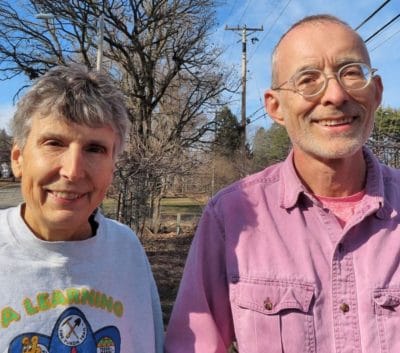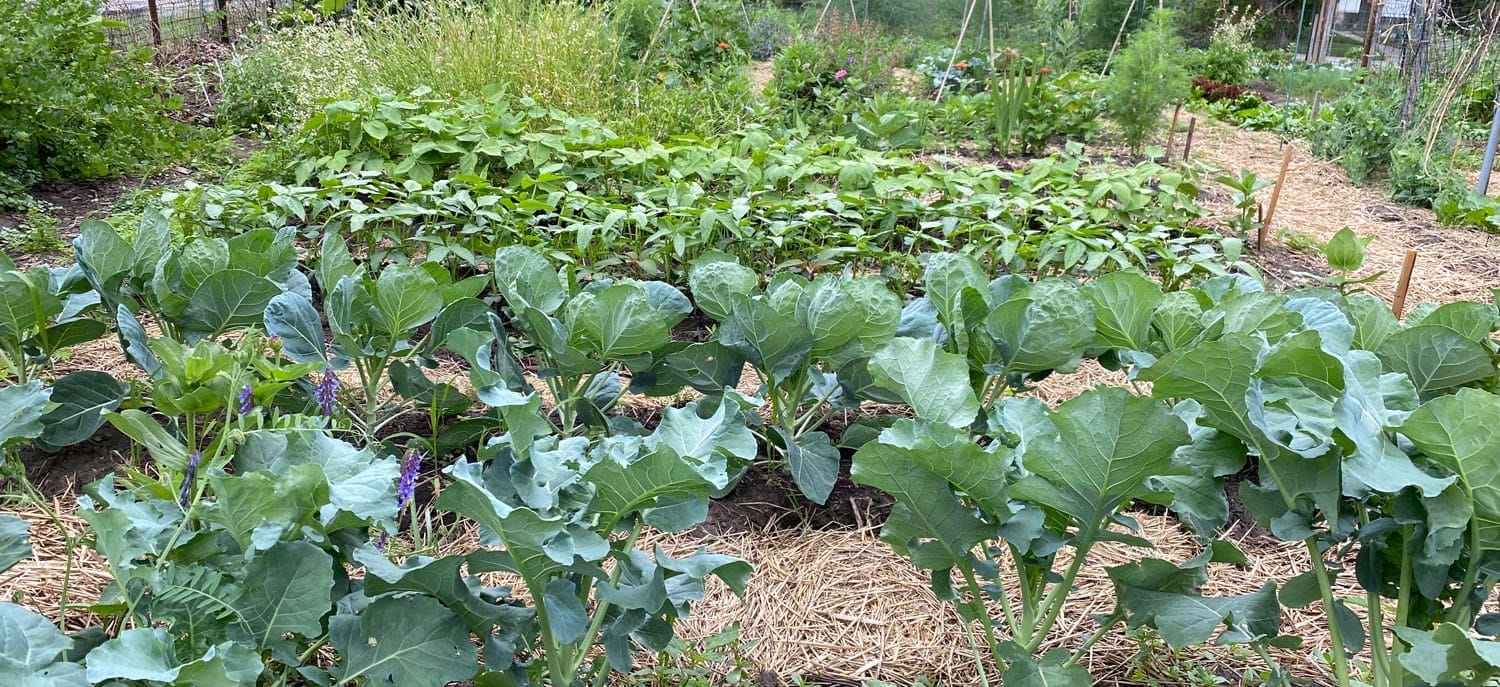Make This Garden Grow
Steve and Ethy Cannon have transformed a formerly barren plot into a community garden space.

Steve and Ethy Cannon
If you live in Ames, Iowa, you’ve likely driven past the home of Steve and Ethy Cannon – and the community garden, with its Practical Farmers of Iowa sign on the gate, they started across the street.
What began as a barren plot by a railroad track at the corner of Ridgewood Avenue and 13th Street has turned into a bountiful growing space. The variety of crops is staggering and includes everything from apricot trees to lima beans and pawpaws.
In the summer, the community garden bursts with color from roses, zinnias, cosmos and gladiolus flowers. The Cannons have about a century of gardening experience between them, and they have honed it to the benefit of the surrounding area.
“There are seven or eight households that we share the garden with,” Ethy says. “Most of our garden partners are neighbors and friends looking for growing space.”
The community garden is an outgrowth of Steve and Ethy’s passion for plants, which manifests in their personal and professional lives, (they both work for the U.S. Department of Agriculture, where Ethy researches maize and Steve, soybeans and legumes). Their home’s backyard faces out onto busy 13th Street, a major road that spans the entire city and connects to Interstate 35.
To create more space for plants, the Cannons first turned the street-facing yard and driveway into a large garden, using the sunny spots to grow food. To reduce noise, they installed a fence that uses semi-translucent panels set in custom wooden frames. Trees and flowers blooming along the edges add to the beauty and sense of serenity within.
Steve and Ethy quickly used up every possible inch of yard for their personal garden. In 2008, they found a one-sixth-acre lot across the road, situated next to Ames’ north-south railroad track. Upon asking around, they discovered the land belonged to a neighbor who had since moved away.
The space was unassuming and there was potential for heavy compaction from decades of trains rolling in and out. The Cannons, eager to transform the barren ground, bought the lot and broke ground soon after. As they began to sow and cultivate, they were pleased to find the soil instantly receptive to gardening.
Now, it grows a bounty of vibrant berries, orchard fruits, greens and legumes. The extra space lets them experiment. “We often try crops that aren’t usually grown in Iowa, just to see what happens,” Ethy says.
Potato bean, a perennial legume that yields potato-like tubers and beans, is one such plant. Despite the name similarity, it’s not related to potatoes, which are in the nightshade family.
Steve is interested in potato bean’s potential as a staple food crop. As a legume, it fixes its own nitrogen. It’s also high in protein – about 15%, compared with 4% protein for potatoes. The Cannons found that potato bean grows well in Iowa soil, and the pound they harvest turns into potato chips, curry and hearty soup for them to enjoy.
Coming Together
The Cannons decided almost from the get-go that they’d make plots in the 13th Street garden available to others. But before they could do that, they had to do the work of preparing the land for gardening.
“For the first couple of years, we worked ourselves to convert it from a fallow, grassy plot, to fence it to keep animals out and to plant trees and lay out paths,” Steve recalls. Once the garden was fully realized, they gradually opened the space to others.
Most of the plots belong to fellow garden partners, but the garden’s reputation has grown such that people occasionally contact the Cannons to apply for space – in some cases, even sending a resume of gardening pictures.
There’s no charge for a plot, but Steve and Ethy ask for occasional help with harvesting, path maintenance, watering and weeding the shared strawberry beds.

A view of the community garden the Cannons started in Ames, Iowa.
While they can’t offer space to everyone, the Cannons love sharing their story and knowledge. In 2010, they showed off the garden’s transformation during a PFI field day called “Finding Civilization in the Age of Lawnlessness.” Pictures of the event show the garden bursting with sunflowers, tall grasses and flowers.
These days, the Cannons don’t host many formal events, but people who walk by often comment on the garden, so Ethy will invite them in for a tour. As frequent donors to PFI, the Cannons also help support other growers who share their stories and farming knowledge.
Steve and Ethy grow food from April to November, often walking to the garden for lunch. They eat their harvest year-round in preserves – juicy apricots, tart aronia berry juice and green peas during the cold, drab winter months.
Planting, watering, cultivating and harvesting keeps them fit. Plus, gardening provides a creative outlet – like planting zinnias between onion rows for shading. The Cannons advise beginning gardeners to start small.
“Gardening is more than tending the soil, preparing beds, planting seeds, nurturing plants and harvesting,” Ethy says. “One must also learn how to cook from the garden.”
Transformation is a risk that has paid delicious dividends for themselves and their community.
